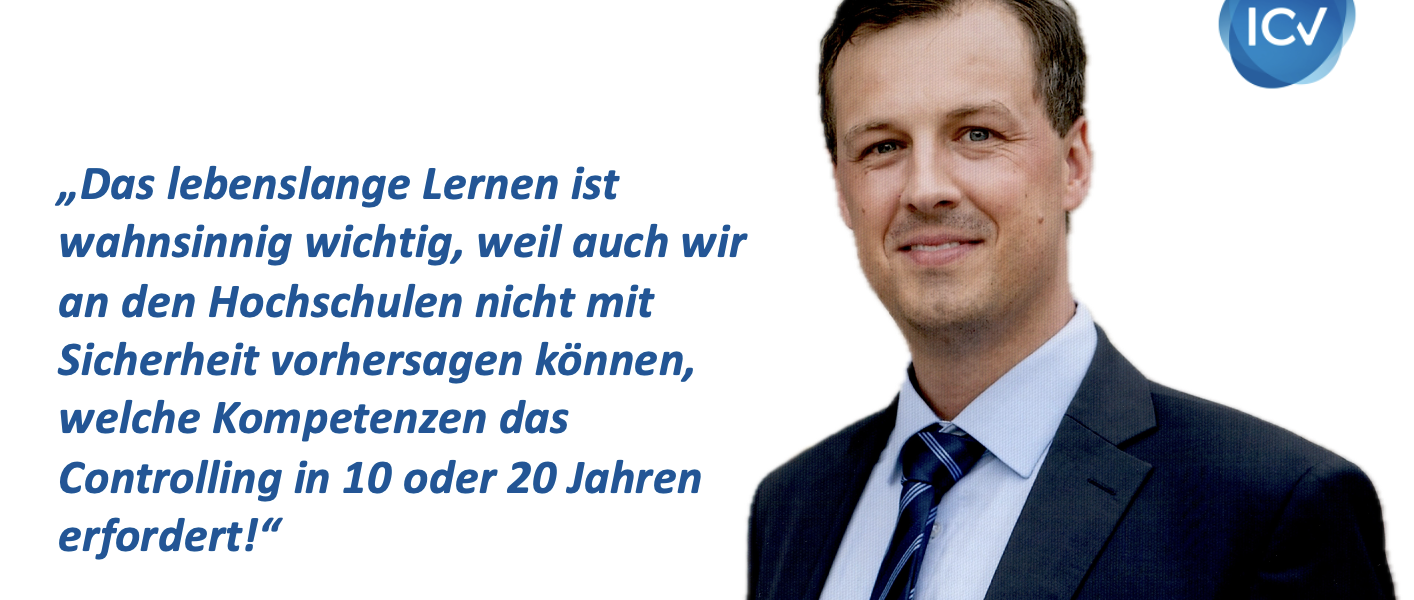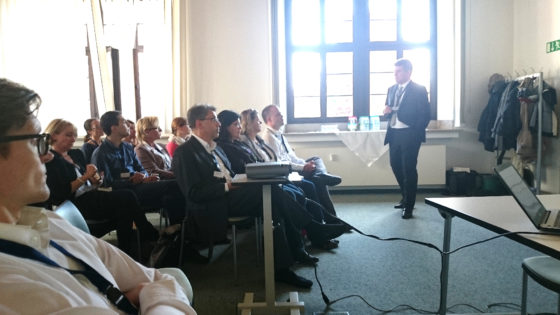Die Controlling Community hat mit Prof. Dr. Björn Baltzer vielleicht zuletzt als Avatar im Metaverse Bekanntschaft gemacht. Denn am virtuellen ICV Event, den Controlling Competence Spaces, war er mit viel Engagement beteiligt. Doch auch offline ist er im ICV Netzwerk anzutreffen. Seit diesem Jahr sogar in einer neuen Rolle. Hier erfahren Sie mehr über Prof. Dr. Björn Baltzer und sein Ehrenamt im ICV.
ICV: Seit wann sind Sie Mitglied und wie haben Sie sich seither engagiert?
Prof. Dr. Björn Baltzer: Ich bin während meiner Promotion im Jahr 2009, ICV-Mitglied geworden, da mich ein konkreter Fachkreis interessiert hat. Ich habe mich direkt dem Arbeitskreis Franken angeschlossen und 2020 dessen Co-Leitung übernommen. 2024 habe ich die Controlling Competence Spaces mitorganisiert und jetzt, mit Beginn des Jahres 2025, die neue Rolle als Executive Advisor Hochschulen übernommen.
ICV: Welche Position haben Sie außerhalb des ICV?
Prof. Dr. Björn Baltzer: Ich bin seit einigen Jahren Professor für Controlling und Rechnungswesen an der Technischen Hochschule Würzburg Schweinfurt. Davor war ich viele Jahre in einem internationalen Konzern im Controlling und in kaufmännischen Leitungsfunktionen tätig.
ICV: Wie sehen Sie das Zusammenspiel von Wissenschaft und Praxis?
Prof. Dr. Björn Baltzer: Die beiden gehen aus meiner Sicht Hand in Hand. Das wird auch im ICV deutlich: Hier sind zahlreiche Wissenschaftler sowohl im Vorstand als auch im Kuratorium und vor allem in den Arbeitskreisen engagiert. Wir aus der Wissenschaft bekommen durch die Mitarbeit im ICV die Themen mit, die das Controlling in der Praxis aktuell bewegt. Und wir haben unsererseits die Möglichkeit, Lösungen in die Praxis zurückzuspielen, die in der Wissenschaft entwickelt wurden.
ICV: Und nun haben Sie zu Anfang des Jahres die neu geschaffene Position des ICV Executive Advisor Hochschulen übernommen. Was können wir uns darunter vorstellen?
Prof. Dr. Björn Baltzer: Als Wissenschaftler habe ich im vergangenen Jahr eine Studie über den ICV gemacht und intern präsentiert. Daraus ist dann die Idee geboren worden, diese Schnittstelle zu institutionalisieren. Das heißt, eine Position zu schaffen, um die Kontakte zwischen ICV und der Wissenschaft zu koordinieren. Ich bin natürlich nicht der Einzige, der diese Kontakte hält – ganz im Gegenteil. Aber ich koordiniere die Kontakte in beide Richtungen. So nehme ich zum Beispiel Anfragen aus der Wissenschaft an und streue diese im ICV. Ich bin aber tatsächlich gerade noch dabei, die neue Rolle zu definieren.
ICV: Wie bewerten Sie als Hochschulprofessor das Netzwerk des ICV?
Prof. Dr. Björn Baltzer: Für mich war das Netzwerk schon immer sehr wichtig – auch als ich noch kein Hochschullehrer, sondern in der Praxis war. In den vielen verschiedenen Arbeitskreisen hat man sowohl auf fachlicher als auch auf regionaler Ebene die Möglichkeit, sich zu vernetzen und auszutauschen. Das ist ein Angebot, das für jeden, der teilnimmt, großen Mehrwert stiftet.
ICV: Was ist Ihrer Meinung nach in der Hochschulausbildung wichtig, um Studierende bestmöglich auf die Praxis im Controlling vorzubereiten?
Prof. Dr. Björn Baltzer: Das ist eine Frage nach den Kompetenzen der angehenden Controllerinnen und Controller – und hier gilt natürlich grundsätzlich: mehr schadet nie! Es gibt viele Kompetenzen, die hilfreich und wichtig sind, und diese wurden gerade auch im aktualisierten Controller Leitbild sehr gut beschrieben. Ich möchte hier nur zwei herausgreifen, die mir persönlich sehr wichtig sind. Das eine ist ein umfassendes Verständnis für wirtschaftliche Fragestellungen. Es ist elementar, zu verstehen, wie das eigene Unternehmen und die Branche funktionieren. Auch ein Grundverständnis für gesamtwirtschaftliche Zusammenhänge ist essenziell. Das zweite ist Offenheit für Neues. Das lebenslange Lernen ist wahnsinnig wichtig, weil auch wir an den Hochschulen nicht mit Sicherheit vorhersagen können, welche Kompetenzen das Controlling in 10 oder 20 Jahren erfordert!
The controlling community may have most recently become acquainted with Prof. Dr. Björn Baltzer as an avatar in the metaverse. He was very involved in the virtual ICV event, the Controlling Competence Spaces. But he can also be found offline in the ICV network. Since this year, even in a new role. Here you can find out more about Prof. Dr. Björn Baltzer and his voluntary work in the ICV.
ICV: How long have you been a member and how have you been involved since then?
Prof. Dr. Björn Baltzer: I became an ICV member during my doctorate in 2009 because I was interested in a specific expert work group. I joined the Wrk Group Franken and took over its co-leadership in 2020. In 2024, I helped organize the Controlling Competence Spaces and now, at the beginning of 2025, I have taken on the new role of Executive Advisor Universities.
ICV: What position do you have outside the ICV?
Prof. Dr. Björn Baltzer: I have been a professor of controlling and accounting at the Technical University of Würzburg Schweinfurt for several years. Before that, I had worked for many years in controlling and commercial management positions at an international corporation.
ICV: How do you see the interaction between science and practice?
Prof. Dr. Björn Baltzer: In my view, the two go hand in hand. This is also clear in the ICV: numerous scientists are involved in both the Board and the Board of Trustees and, above all, in the work groups. Through our work in the ICV, we in science are informed about the issues that are currently affecting controlling in practice. And we, for our part, have the opportunity to feed solutions that have been developed in science back into practice.
ICV: And now, at the beginning of the year, you took on the newly created position of ICV Executive Advisor Universities. What does it mean?
Prof. Dr. Björn Baltzer: As a scientist, I conducted a study on the ICV last year and presented it internally. This gave rise to the idea of institutionalizing this interface. That means creating a position to coordinate the contacts between the ICV and science. Of course, I am not the only one who maintains these contacts – quite the opposite. But I coordinate the contacts in both directions. For example, I accept inquiries from science and distribute them within the ICV. But I am actually still in the process of defining the new role.
ICV: As a university professor, how do you evaluate the ICV network?
Prof. Dr. Björn Baltzer: The network has always been very important to me – even when I was not yet a university lecturer but was in practice. In the many different work groups you have the opportunity to network and exchange ideas at both a professional and regional level. This is an offer that creates great added value for everyone who takes part.
ICV: In your opinion, what is important in university education to best prepare students for practice in controlling?
Prof. Dr. Björn Baltzer: This is a question about the skills of prospective controllers – and here, of course, the general rule is: more never hurts! There are many skills that are helpful and important, and these have been described very well in the updated Controller Mission Statement. I would like to pick out just two that are very important to me personally. One is a comprehensive understanding of economic issues. It is fundamental to understand how your own company and the industry work. A basic understanding of macroeconomic relationships is also essential. The second is openness to new things. Lifelong learning is incredibly important because even we at universities cannot predict with certainty what skills controlling will require in 10 or 20 years!



